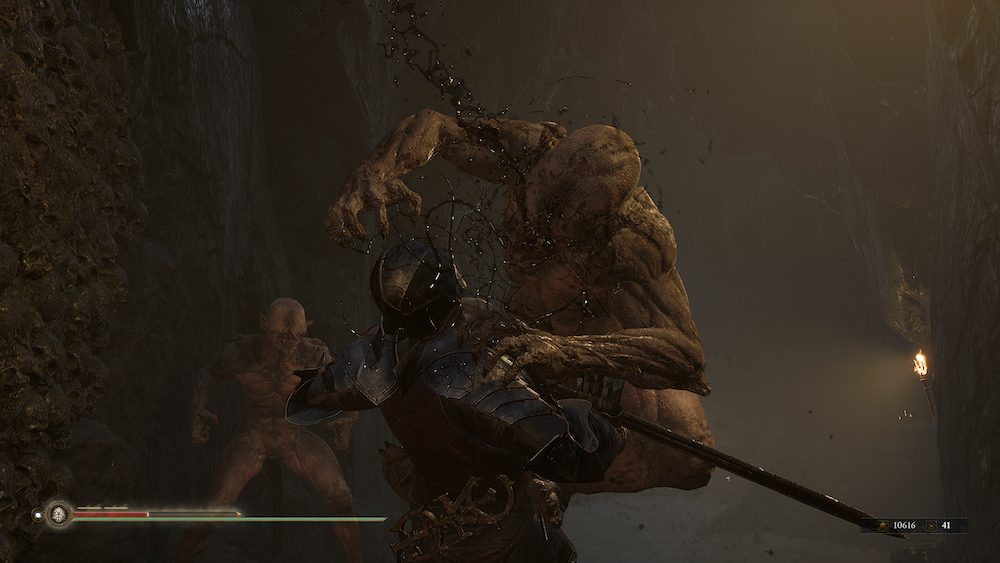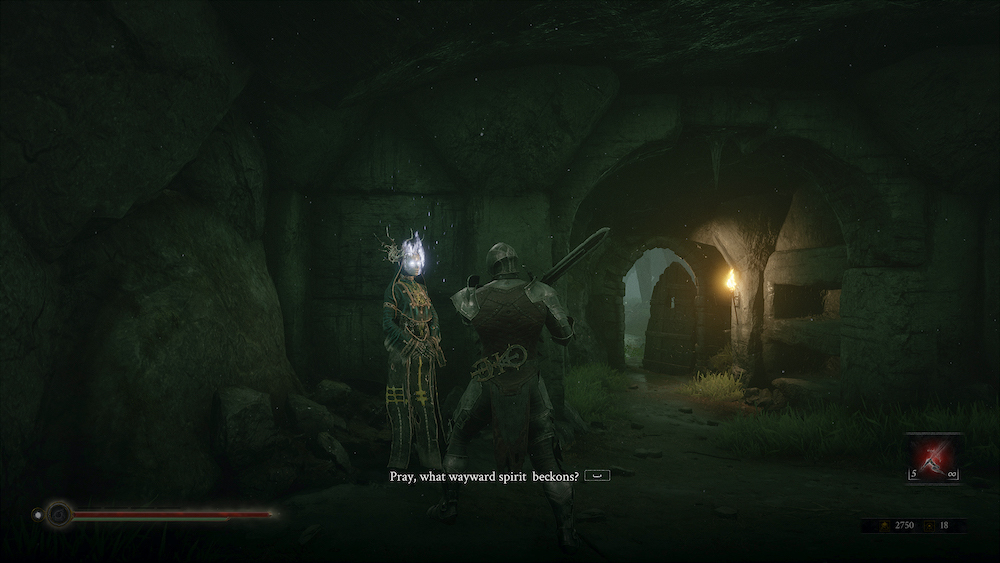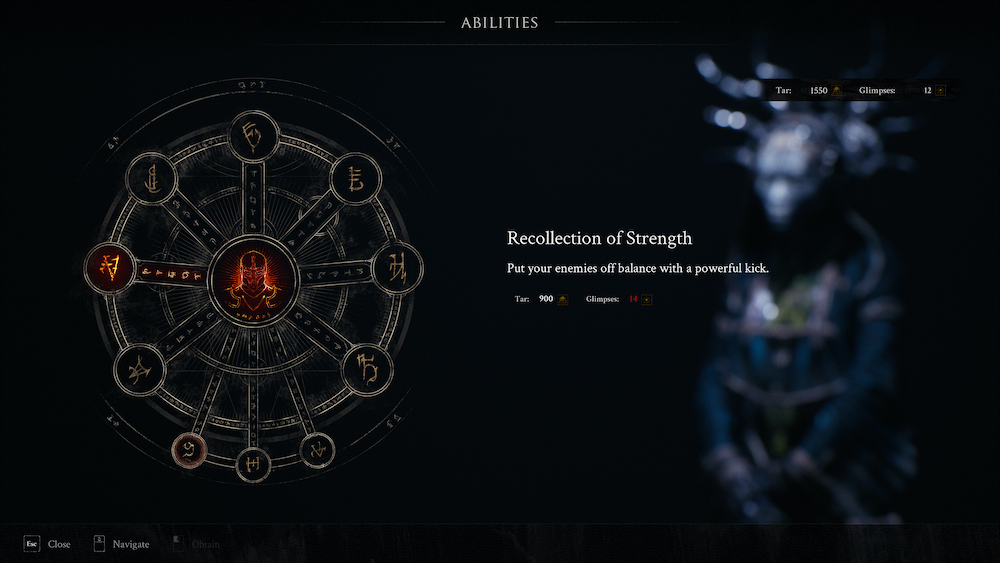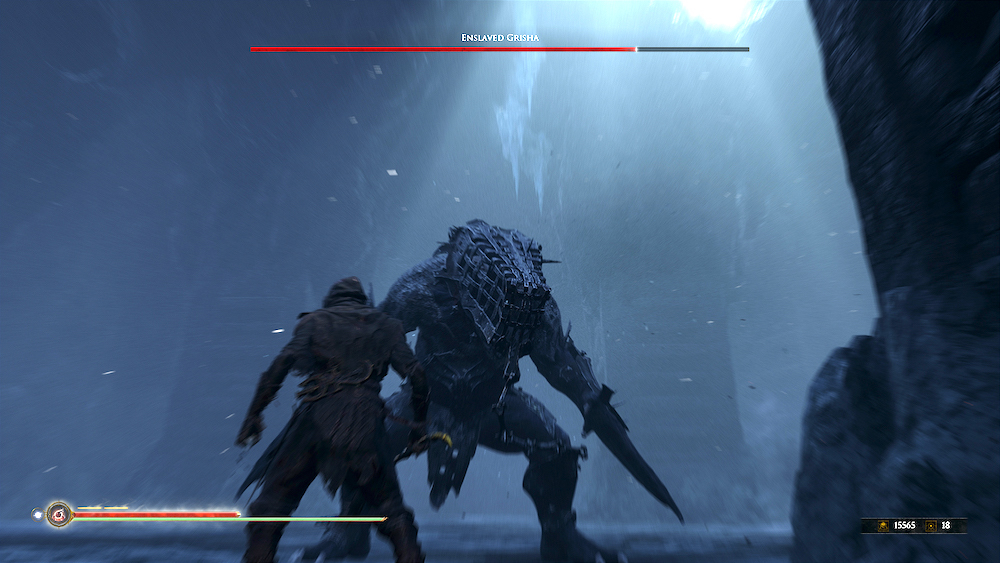One of the first things I did in Mortal Shell, after getting walloped in the tutorial by a huge guy with a sword and stealing the corpse of an unnamed knight, was watch two guys sit by a campfire while one played a lute.
Given that this is a video game, the two goblin-looking locals turned hostile as I approached them, with the musician trading his lute for a hatchet before stalking my way. I cut through them with my huge two-handed claymore, then picked up the lute and spent the next five or so minutes learning to play it.
Hitting the "use" button on the lute about 10 times, I gained enough "familiarity" with it that my character could provide a performance of his own. I still have no idea what the lute is for, why I could pick it up and add it to my inventory, or what use repeatedly telling my character to pick away at its strings might bear in the future. That's kind of my general impression of Mortal Shell, as well--there's a lot about the game I don't understand. But like the Souls games from which it draws obvious inspiration, it seems like there's a lot to uncover and master in Mortal Shell.
Musical interludes aside, Mortal Shell is a game mostly about fighting deliberate, brutal sword duels with a variety of spooky enemies. Developer Cold Symmetry provided a short preview build of the game, which included what seems to be its opening tutorial, a look at a swampy area, and a dark, dank crypt, culminating with a boss fight. The whole thing took about two hours to get through on my first attempt, and about 20 minutes on my second--which might give you an indication of the curve of mastering Mortal Shell and what's possible once you get the hang of the game.

Souls-Inspired
Even from the first glimpses at Mortal Shell in its reveal trailer, the game gave off a big Dark Souls vibe, and its gameplay is clearly inspired by From Software's epics. Combat generally takes place against one or two enemies at a time as you swing huge weapons at each other in slow, massive arcs that dish out big damage. You have a green stamina bar that governs how many thrusts, slashes, sidesteps, and rolls you can do in a given fight before you need to take a second to let it recharge. One or two blows from an enemy are enough to decimate you, so death comes swiftly and often, especially while you're getting the hang of Mortal Shell's key mechanics.
In a lot of ways, Mortal Shell plays exactly like a Souls game. Dodging is an essential skill for getting clear of enemy attacks, and provides you with a few brief frames of invincibility if you time it right. You have a speedier light attack and a slower heavy attack, which usually also provides greater range. Even the controls largely mirror Dark Souls and Bloodborne.
Early in the preview, we got hold of a magical Tarnished Seal item, which is used to parry enemy blows, if your timing is right on. As you fight, you build up a meter called Resolve, and every time you complete a full increment, you can use the seal to parry a blow and open up an enemy to a brutal riposte attack--one that's exactly like Bloodborne's Visceral Attack. The riposte also heals you, which is essential, because one of the key things that Mortal Shell doesn't have is a reliable batch of healing items like Estus flasks or blood vials.
The one big addition Mortal Shell brings to combat is the "harden" ability, which allows you to turn your body to stone almost at will in the middle of a fight. Harden lets you take a hit from an enemy, and if you time it right, to stagger them as their weapon bounces off you. That gives you a brief opening for a counterattack or to step back out of harm's way. You can use harden anytime, and it's specifically useful to harden mid-attack--that can let you get in close as your enemy attacks and fails to harm you, allowing you to unfreeze and score some damage without having to worry about timing a swing or getting caught out of position.
So fighting any of the enemies in Mortal Shell is about carefully managing dodging, hardening, parrying, and attacking, with careful attention paid to how long your moves take and how much space you need to land them. Harden in particular is a move that takes some getting used to; it doesn't require quite the same split-second timing as the Tarnished Seal parry, but you still need to use hardening strategically, or it can leave you open to additional attacks. Harden also has a long-enough cooldown that you can't spam it or rely on it to get you out of all situations.

How you fight also depends on two other things: your weapon and your character. You play as a strange, faceless white humanoid at the start of the game, without much of a health bar. But shortly after the preview build's tutorial, we were thrown into a wooded, swampy area called Fallgrim Outskirts, and just ahead of the start, we encountered a corpse leaned against a gravestone. When you find bodies like this, you can inhabit them--they're the "shells" mentioned in the title. The preview included two shells: a burly, middle-of-the-road knight that can build and maintain a lot of resolve, and a quick-moving thief with lots of stamina.
Which shell you're inhabiting dictates a lot of how you'll fight. The knight's ability to gather resolve quickly means parrying and respoting becomes a more essential part of his fighting style. He pairs well with the heavy sword, because it is more likely to stagger enemies, making up for its slow swing speed.
We found the thief's body a little deeper into the preview, hidden in a strange tomb, along with a new weapon, the hammer and tongs. Instead of a two-handed weapon, the hammer and tongs act as a pair, one in each hand, and can inflict enemies with poison. They're faster than the sword, but the drawback is that they don't stagger your opponents, leaving you less time to maneuver. Paired with the thief's higher stamina, though, it becomes possible to pummel some enemies into submission before they have a chance to fight back. The thief also has a shadowy dodge that turns him temporarily invisible (or perhaps incorporeal), which makes it easier to get clear of bad situations, as opposed to the knight's heavier roll.
Using the right shell for the job seems like a big part of the Mortal Shell experience, and the menu in the game suggested there would be two more to use beyond the pair that we discovered. They excel at different things, with the knight seemingly better for duels with tough enemies (and the eventual boss), and the thief better for clearing out smaller opponents quickly. You can only switch between shells if you physically walk up to them, though, unless you use a special item that lets you instantly switch between them. So, you're not bouncing between shells as the situation demands--like in a Souls game, you need to plan, study, and react to what you're facing, and that usually means dying and coming back better prepared.

Becoming "Familiar" With A Weird World
Combat isn't the only thing that feels like Dark Souls in Mortal Shell. The construction of the game's world also seems like it's borrowing heavily from From Software's approach, and in the preview build we played, we were left with a lot of questions about what's going on in this fantasy world. Discovering the game's story seems to be focused on picking up on clues from the game's environment and from bits of lore included with the items you'll find scattered around.
Each item has a flavor text attached to it, like in Dark Souls games, but you have to learn about everything in Mortal Shell by experiencing it. You learn the effects of a strange mushroom by eating it, raising your "familiarity" with it. You might then discover that it'll heal you over time (which is the only way in the preview build to restore health, outside of doing a Resolve riposte) or poison you. Eat enough poison mushrooms, though, and you can develop a poison immunity, just like if you mess with the lute enough times, you'll become proficient in playing it. Familiarity also sometimes gives you new flavor text, unlocking a slightly better understanding of the world.
The most interesting tidbits were related to the shells themselves--these aren't just bodies you find and snag. They seem to be characters, with (probably tragic) pasts that illuminate the world around you. Learning about them gives you pieces of their stories, while also making them more powerful and more effective.
As you kill enemies, you gather a special substance called nectar, or tar for short. Like the souls of Dark Souls or the blood echoes of Bloodborne, tar is the thing you use to level up, and if you're killed in battle, you lose it, unless you manage to return to the scene of the crime and reclaim it.
In the preview build, we got a look at how you seemingly level up your characters in Mortal Shell. In the strange crypt that marked the second half of the preview area, we encountered a mask-wearing woman called Sister Genessa, who offered us a sip of "sacred tar." Taking her up on the offer lets you spend your tar like you would souls, unlocking new abilities for your shell. But to do that, you must first unlock the shell's name, which provides some backstory about it. We discovered the knight was called Harros, the Vassal, whose story sounded like it related to some strange and spooky religious cultists. The thief-like character was Tiel, the Acolyte, who seemed to have a history with Genessa herself.

Once you know the name of your shell, you can use special items called Effigies to instantly switch between them. You also gain access to the rest of their upgrades, which might make their harden ability stronger, or boost their health reclamation from your Resolve riposte. The upgrades are unique to each shell, and each one has its own set of upgrade materials, so you'll need to play them in order to make them stronger.
The last portion of the demo took us through a crypt, where we fought a number of strange enemies. There was a leaping man-beast-type creature, which could inflict poison or hit you in the shoulders and knock your character fully to the ground. Tougher enemies again recalled Dark Souls: one was a monster with swords stuck through its chest, who would pull them out and throw them until you closed the distance, and ended the fight by pulling off his own head, throwing it at you, and then exploding into a cloud of poisonous gas. Another was a huge creature with blades for hands, whose long reach made it tough to dodge clear.
The preview ended with Mortal Shell's take on a boss fight, against a huge creature with swords for hands and a metal cage over its head, called the Enslaved Grisha. As you might expect, it brought all the tough elements of Mortal Shell's combat together, with devastating hits, a long reach, and multiple combos of attacks, some of which were unblockable. It also threatened to charge from across the huge icy cave in which it was found, and would slam its head into the ground, jostling loose stalactites from the ceiling and sending them crashing down.
As Harros, I'm pretty proud to say that I bested the boss on the first go, largely with deft use of harden, and the experience really showcased how that ability will work in the full game. Harden is a Trojan horse of an ability, allowing you to bait an attack from an enemy to open them up to a big counter. I would routinely start a thrusting heavy attack, harden midway through, and tank one of the boss' swings, only to unfreeze and stab it in the throat. That did a fair amount of damage and gave me time to dance away and avoid another swing from the boss. The Grisha would come back after me right around the time harden had cooled down, allowing me to repeat the process.
Of course, it wasn't always that easy. A big hit from the Grisha can ruin your day, and there aren't many good ways to heal up in Mortal Shell, at least in this preview. Healing either relies on skill with a Resolve riposte, or on finding items like food in the world that can be accessed from a quick bar. The mushrooms that I had to restore health would take a full minute to be fully effective, which meant keeping my distance when I knew one more blow from the Grisha could take me down.

And all those elements work to make Mortal Shell deliberate, strategic, and calculating in a way that's similar to, but not the same as, From Software's games. The fact that you can't heal instantly means you have to be extremely cautious, but the fact that you can harden your body to absorb a blow in an emergency or as part of a battle strategy allows you to find other ways to recover. Mortal Shell is a tough and punishing game like those that inspire it, but in the short preview we played, it found ways to take elements of the Dark Souls formula and recombine them into something new.
What I'm most interested in with Mortal Shell, though, is its strange and seemingly vast world. I have no idea yet who the spirit-like player character is, or the identity and role of Sister Genessa, or what this world is supposed to be, or who lives there. I want to know more about Harros and Tiel, their histories, and their seemingly untimely deaths.
And I definitely want to know what I can do with that lute.
Mortal Shell is due out on PlayStation 4, Xbox One, and PC via the Epic Games Store this fall. It'll hit Steam in 2021.







